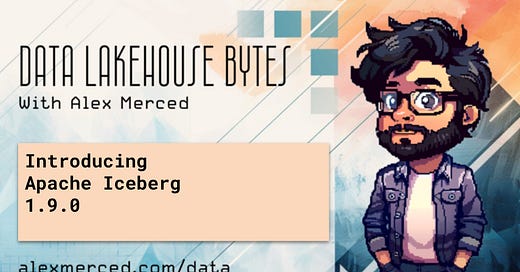Introducing Apache Iceberg 1.9.0: Native Geospatial Support, Enhanced Row Lineage, and More
Seeing V3 Table Features Shaping Up!
Free Resources
On April 28, 2025, the Apache Iceberg community officially released Apache Iceberg 1.9.0, bringing a new wave of features, enhancements, and important deprecations. This release strengthens Iceberg’s capabilities as a leading open table format for lakehouse architectures, with significant steps toward native geospatial data support and more flexible row-level operations.
If you work with large-scale analytics, real-time data platforms, or spatial datasets, there is a lot to be excited about in this release.
For the complete list of changes, visit the full 1.9.0 release notes on GitHub.
New Feature: Native Geospatial Data Support
One of the most important additions in Iceberg 1.9.0 is native support for geospatial types. Iceberg tables can now store and manage geospatial data using a new geometry logical type.
Key highlights of this feature include:
Geometry type support with Well-Known Binary (WKB) encoding for interoperability across tools and engines.
Coordinate Reference System (CRS) set to OGC:CRS84 (longitude-latitude) by default.
Multi-dimensional support for XY, XYZ, XYM, and XYZM coordinate formats.
Optional spatial statistics like bounding boxes for improved query pruning and spatial indexing.
This addition opens the door for using Iceberg to manage location-based datasets at scale, including city-wide traffic patterns, drone mapping outputs, agricultural field data, and global satellite imagery catalogs.
Iceberg’s geospatial model closely follows the GeoParquet specification, ensuring compatibility and consistent behavior across open data standards.
Enhanced Row Lineage with Equality Deletes
Iceberg 1.9 also makes a major advancement in row-level metadata tracking with improvements to row lineage support. Until now, row lineage and equality deletes could not coexist due to technical constraints. With 1.9, that limitation is removed.
When equality deletes are applied to a table with row lineage enabled:
Deleted rows are treated as fully removed.
Inserted or updated rows are assigned new unique row IDs.
This change enables users to leverage both efficient mutation operations (via equality deletes) and detailed historical tracking of changes to individual rows.
The result is a more powerful foundation for data auditing, compliance use cases, and large-scale multi-writer environments where row history must be preserved without sacrificing performance.
Deprecations and End of Support
As Iceberg continues to evolve, some older technologies are being phased out:
Spark 3.3 support has been removed. Users should upgrade to Spark 3.4 or newer versions.
Hadoop 2 support has been removed. Iceberg now requires Hadoop 3.x moving forward.
These deprecations allow the Iceberg project to reduce technical debt, adopt new file system capabilities, and focus on modern runtime environments.
Other Noteworthy Improvements
Iceberg 1.9.0 also introduces a range of additional improvements across the stack:
Partition Statistics Writer and Reader
Enables engines to gather and leverage partition-level statistics for smarter query optimization efficiently.InternalData API Builders
Provides engine developers with more efficient methods for reading and writing Iceberg data internally.Variant Logical Type Support
Adds full support for semi-structured data formats like JSON, extending Iceberg’s versatility for modern analytics use cases.Nanosecond Timestamp Support
Improved timestamp precision across Parquet, ORC, and Avro formats.Kafka Connect Integration Improvements
Adds new Single Message Transforms (SMTs) to make integrating Iceberg with Debezium and AWS DMS easier and more resilient.Dependency Updates
Includes important library updates such as Parquet 1.15.1 (addressing CVE-2025–30065), Netty, Jackson, SQLite JDBC, and adjustments to AWS SDK versions for stability.
Why Apache Iceberg 1.9.0 Matters
Apache Iceberg has always aimed to be a platform for the future of data lakes. With version 1.9, Iceberg extends its vision beyond structured analytics into spatial and temporal domains, offering a clean, open foundation for building modern, multi-modal data platforms.
Whether you are ingesting high-velocity IoT sensor data, managing real-time geospatial applications, or auditing complex historical data transformations, Iceberg 1.9.0 gives you the flexibility and robustness needed to operate at scale.



